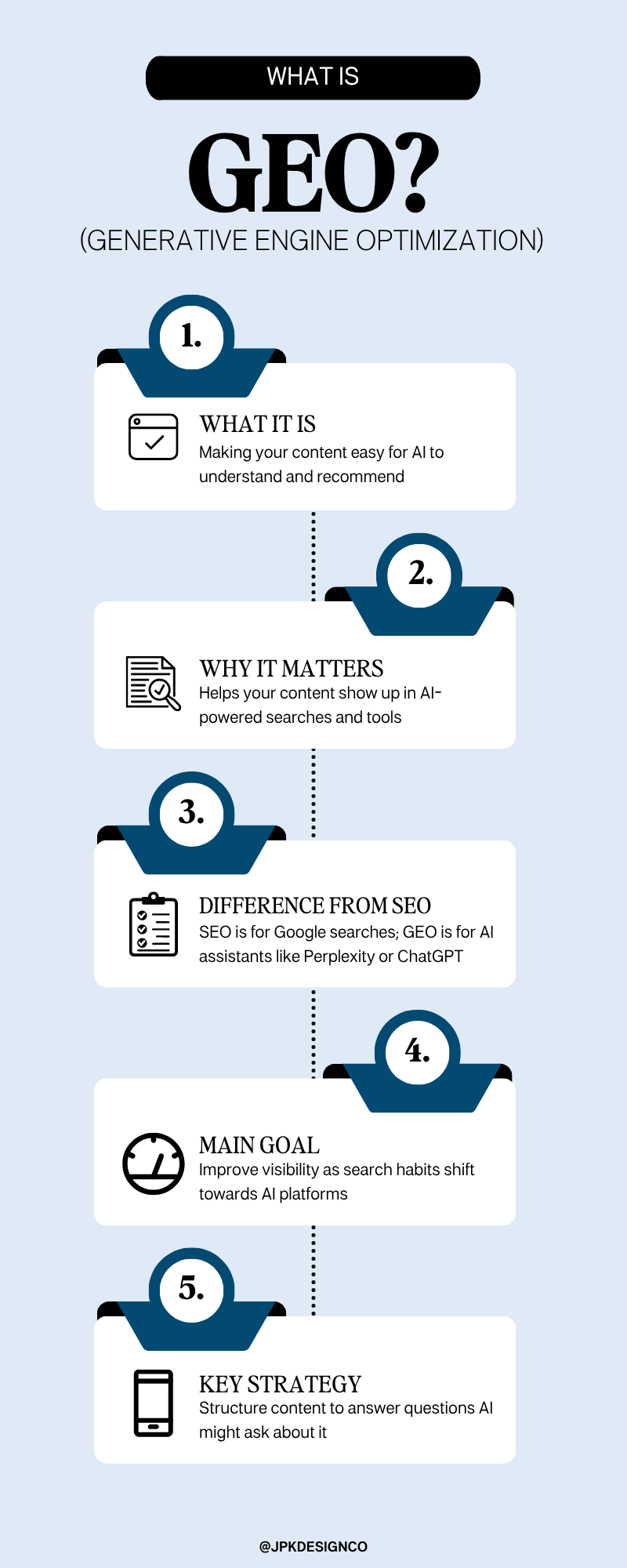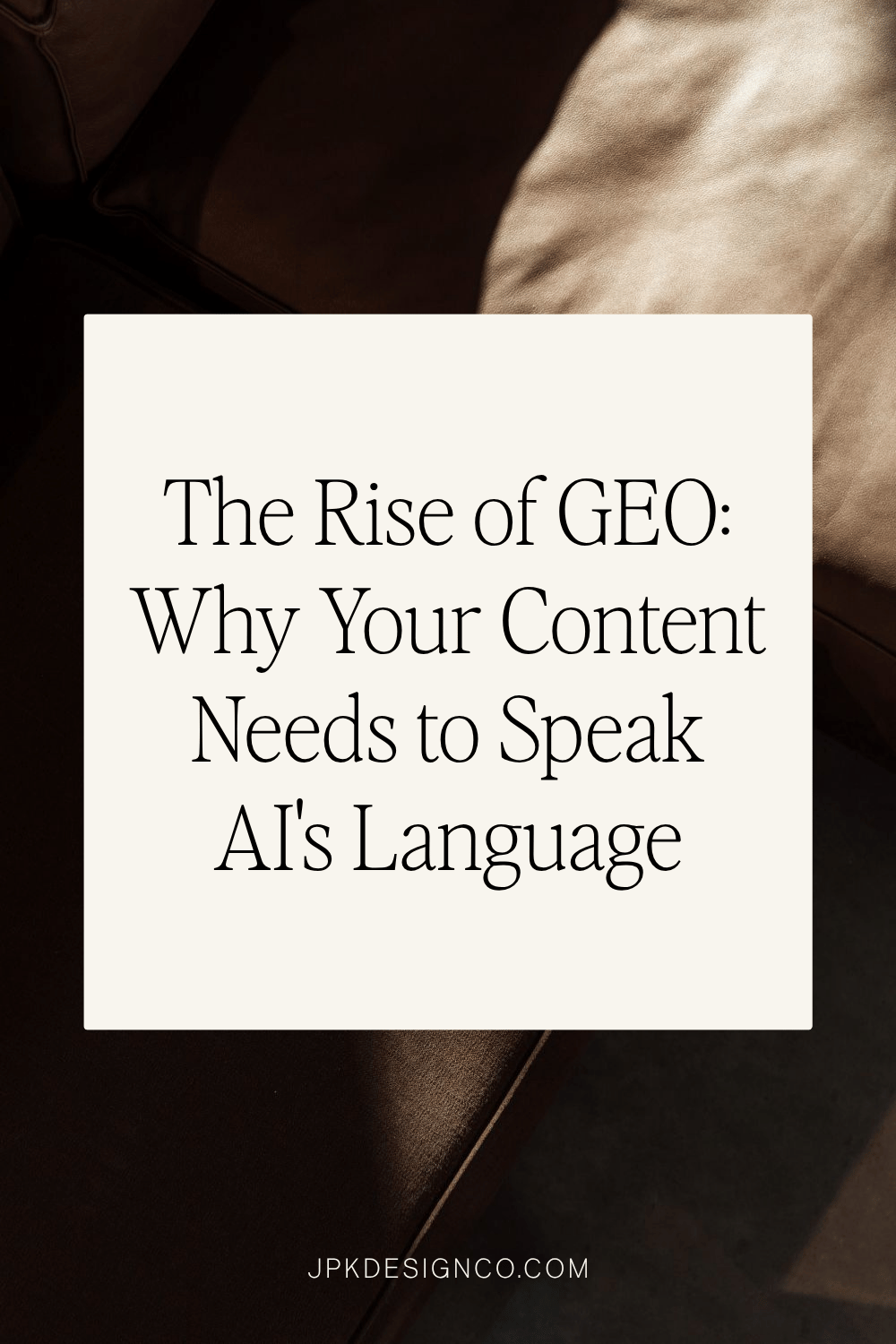The Rise of GEO: Why Your Content Needs to Speak AI's Language
Table of Contents Show
GEO : How AI is Changing Digital Marketing (And Why You Should Care)
Something big is happening in digital marketing…
I came across an article about GEO in Search Engine Land the other day that made me sit up straight in my chair. See, while most marketers are busy optimizing for Google, they're missing a MAJOR shift in how people actually find information online.
Here's what caught my attention: some businesses are finding that AI platforms are sending them BETTER leads than traditional search (not just more leads - better ones). This isn't just a new marketing buzzword thingy - it's a real change in how people find and interact with content online.
As someone who's always looking out for ways to help you improve your online presence & grow your business, I knew I needed to share this with you. So I've spent the last few weeks researching GEO (Generative Engine Optimization) and testing different AI platforms to understand what this means for small business owners and creators.
In this post, I'll break down:
What GEO actually is (in plain English)
Why it might matter for your business
How it's different from the SEO we're all familiar with
Practical ways to prepare your content for AI platforms
I'm still learning about this myself, but I believe it's something we should all be paying attention to. Let's dive in...
What is Generative Engine Optimization?
GEO, or Generative Engine Optimization, is a new way to think about marketing. It’s about making your content make sense to AI platforms like ChatGPT, Perplexity, Claude, Gemini, Copilot, and Google AI Overviews. While SEO helps you show up in Google searches, GEO helps you appear in AI-generated answers. And this matters because more people are starting to skip Google altogether and go straight to AI tools for answers (yep, it's happening THAT fast).
As more people use AI-powered search tools, the importance of GEO grows, potentially leading to a decrease in the use of traditional search engines. By implementing GEO, you're preparing for this shift in user behavior over the next few years.
Here's what this looks like in real life...
Today: You want to make something with tofu for dinner. You Google "easy tofu dinner recipes," click through a bunch of sites, scan a few recipes, compare them (while getting hungrier and hungrier), and finally pick one that looks good.
Tomorrow: You ask your AI assistant, "What's a healthy tofu recipe I can make in 30 minutes with what's in my kitchen?" The AI knows your cooking style, what ingredients you usually have, and what kinds of recipes you like. The AI tool might then:
Consider your dietary preferences and past searches and recipe choices
Search through its database of recipes
Provide a summarized suggestion like: "How about a Greek Lemon Tofu Bake Skillet? It's healthy, takes about 25 minutes, and uses common ingredients like tofu, lemon, garlic, and olive oil. Would you like me to read out the full recipe or send it to your device?"
In this scenario, you might never see a traditional search results page.
Instead, you’d interact directly with the AI, which provides a curated response based on various factors.
So for businesses and content creators, this means a HUGE shift in how we need to structure our content. It's not just about ranking for keywords on Google anymore - it's about making sure AI tools can understand, categorize, and recommend your content in the right context.
However, it's important to note that this is still a speculative scenario - we’re not quite there yet! AI assistants haven't replaced traditional search, and they won't completely take over anytime soon. But the shift IS happening, and it's happening faster than you might think...
GEO vs. SEO - What's the Difference?
While both GEO and SEO help people find your content online, they work in pretty different ways (and understanding these differences is KEY): GEO focuses on how AI understands and presents information, making sure AI systems understand the meaning and relevance of your content. SEO, however, is about getting your content to rank high on traditional search engines like Google.
Content Structure
SEO: Keywords, meta descriptions, header tags - the stuff we've been doing for years
GEO: Natural language, context, background information (basically making your content actually make sense)
User Experience
SEO: Quick scanning, bullet points, skimmable content (the way we're all used to reading online)
GEO: Conversational flow, complete answers, connected ideas (think more like how you'd explain something to a friend)
Content Delivery
SEO: Ranking for specific search terms (the old-school way)
GEO: Answering broader questions and related topics (the future is here...)
How to Actually Use GEO (Without Losing Your Mind!)
Using GEO effectively means understanding how AI works and creating content it can easily use.
Here’s what you need to do:
Make Your Content Clear and Complete
Write like you're explaining things to a smart friend
Give background information that connects ideas
Use clear organization (like this list... see what I did there?)
Include real examples that make sense
Get the Technical Stuff Right (Don't panic - it's not as scary as it sounds)
Clean up your HTML
Use proper schema markup (your web person will know what this means)
Make sure AI tools can read your content easily
Show You Know Your Stuff (Because expertise will always matter)
Cover topics completely
Connect related content
Use clear examples from real life
What This Means for Your Business
Some businesses are already seeing surprising results in their analytics - AI platforms are bringing them visitors who are more likely to become customers (yep, really!).
Getting started now puts you ahead of the curve.
Quick Wins:
Check if your content makes sense without much context
Look at how your site flows from topic to topic
Fill in gaps in your content
Keep an eye on where your traffic comes from (this part is IMPORTANT)
Long-Term Plan:
Create content that works for both Google and AI (yes, you need both)
Stay up to date with AI changes
Test different platforms (because what works today might change tomorrow...)
Do business terms like SEO and CTA make you go WTH?! 😕🤔
👇 Get access to this free glossary of over 70 terms every new solopreneur needs to know. Clear, simple explanations to help you navigate the business world with confidence.
Frequently Asked Questions About GEO
Q. What is GEO?
Generative Engine Optimization (GEO) is the practice of structuring online content to be easily understood and recommended by AI-powered search and assistance tools, as opposed to SEO, which focuses on optimizing content for traditional search engine rankings.
Q. What are the benefits of using GEO?
GEO can help you reach a wider audience, improve user experience, give you an edge over competitors, build brand authority, provide useful data insights, and keep your content relevant as AI technology advances.
Q. Should I forget about SEO and focus ONLY on GEO?
No way Jose. You need both; think of them as partners, not competitors. SEO is still bringing in traffic and leads - GEO is just adding another layer of visibility. Try to find a good balance between GEO and SEO for your blog, online content, or website.
Q. How often should I update my GEO approach?
Check in every few months, but stay flexible. AI is changing quickly (like, REALLY quickly). What works today might need tweaking tomorrow. Set a quarterly reminder to review your content strategy and analytics.
Q. What matters most about geo?
Clear, helpful content that makes sense in context. But here's the thing... it's not just about being clear. Your content needs to answer questions before people ask them (think about those "related questions" that pop up in Google).
Q: Will this mean I need to redo all my content?
Not necessarily (breathe easy). Start with your most important pages first. Then work on new content with both SEO and GEO in mind. It's about evolution, not revolution.
Q: How do I know if my GEO efforts are working?
Watch your analytics (especially traffic sources and engagement metrics). Look for traffic from AI platforms, longer time on page, and better conversion rates. These are all signs that your content is working harder for you.
AI is changing how people find information online... but here's the good news: if you're already creating helpful, well-organized content, you're halfway there. The key is to start thinking about how AI tools understand and use your content.


